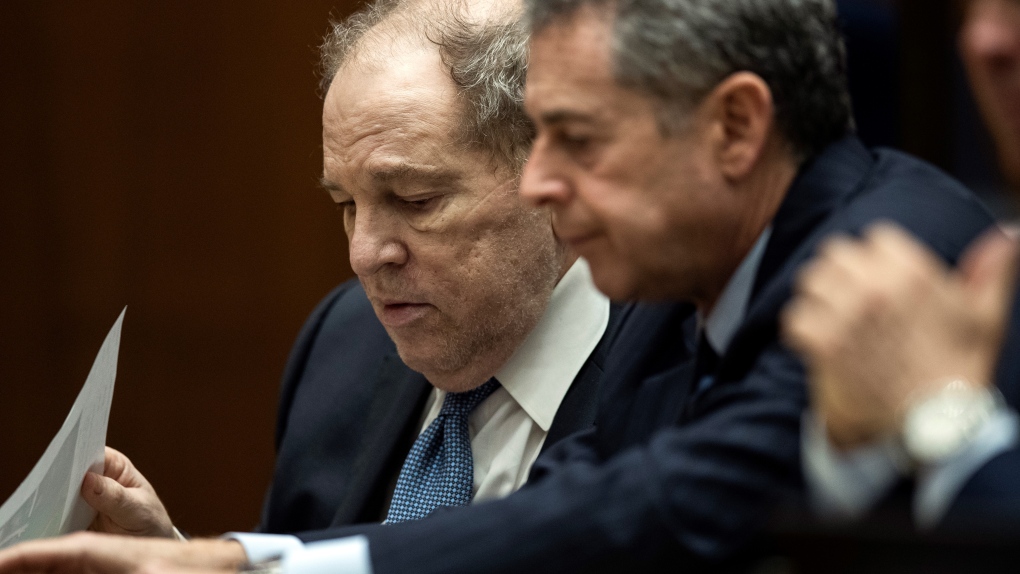LOS ANGELES -
Harvey Weinstein was a "predator" with unmistakable patterns who used his Hollywood power to lure women into meetings, sexually assault them and escape the consequences, a prosecutor said in closing arguments Wednesday at the former movie mogul's Los Angeles trial.
Deputy District Attorney Marlene Martinez said the accusers who testified during the trial entered Weinstein's hotel suites or let him into their hotel rooms with no idea what awaited them.
"Who would suspect that such an entertainment industry titan would be a degenerate rapist?" Deputy District Attorney Marlene Martinez said to jurors.
She constantly emphasized the similarity of the testimony of the four women Weinstein is charged with raping or sexually assaulting and the four other accusers who testified to show his propensity for such acts.
"These are eight women who do not know each other," Martinez said, showing the jury a composite image of all of them on a screen. "They all describe the same conduct by the same man."
Weinstein's attorneys have said, and are likely to argue in their own closing Thursday, that two of the women had consensual sex for career advancement with the movie producer. His attorneys have said the encounters with the other two women didn't happen at all.
After more than five weeks of testimony, jurors, who are expected to get the case Thursday, will be tasked with deciding on two counts of rape and five other counts of sexual assault dating from 2005 to 2013. Weinstein, 70, has pleaded not guilty.
In her closing, Martinez outlined what she said were Weinstein's consistent tactics across decades. He would arrange to meet with a woman at a hotel. Then he would find a way to bring her into his suite. He would then go from "charming and complimentary to aggressive and demanding," she said, either masturbating in front of them, groping them or raping them, often finding ways to prevent them from leaving.
"For this predator, hotels were his trap," Martinez said. "Confined within those walls victims were not able to run from his hulking mass. People were not able to hear their screams, they were not able to see them cower."
She noted that many of the women before their assaults were reassured by the presence of other women who worked with Weinstein. Those women would suddenly and unexpectedly leave the victims alone and isolated with him, Martinez said.
"He used women to make these women feel comfortable," Martinez said, "to get their guard down."
Three such women testified during the trial. All said they had little memory of the accusers or the meetings they had allegedly led them to, which Martinez called "convenient," suggesting they had betrayed their fellow women.
"Isn't there a girl code?" Martinez said. "Apparently, if you know the defendant, there is no girl code."
She said that during the encounters, Weinstein ignored clear and repeated signs of lack of consent.
She frequently harkened back to a line from a witness who seemed of minimal importance when he was on the stand, Weinstein's LA limo driver Freddy Baroth, who testified that he was often ordered to run red lights when Weinstein was in a hurry, saying "when Harvey wants to go, you go."
"He didn't care about `no's," Martinez said. "He didn't care about red lights."
She used variations of the image throughout her argument.
Weinstein, sitting at the defence table, did not look across the courtroom at Martinez during her presentation, staring forward, looking at the screen she was projecting images on, and occasionally looking down to make notes.
During their cross-examinations of the women, defence attorneys often challenged them over continued associations with Weinstein after their alleged assaults. Some met with him or emailed him again. Others attended parties and premieres at his invitation. A massage therapist who alleged he assaulted her after one treatment twice agreed to treat him again.
Martinez urged jurors not to make too much of such choices by the women, saying they were the result of deliberate attempts by Weinstein to cover up what he had done to them.
"If his victims were photographed at these parties," she said, "if they took these meetings, how could they accuse him of sexual assault?"
She said he used his power as much after the assaults as he did before and during them.
"He used that power to live his life without the repercussions of his predatory behavior," Martinez said.
The proceedings have coincided with several trials on both coasts of Hollywood men with #MeToo implications, including the rape trial just down the hall of Danny Masterson, which was declared a mistrial while Martinez was giving her closing argument.
Resources for sexual assault survivors in Canada
If you or someone you know is struggling with sexual assault or trauma, the following resources are available to support people in crisis:
If you are in immediate danger or fear for your safety, you should call 911.
A full list of sexual assault centres in Canada that offer information, advocacy and counselling can be found at ReeseCommunity.com. Resources in your community can be found by entering your postal code.
Helplines, legal services and locations that offer sexual assault kits in Alberta, B.C., Saskatchewan, Manitoba, Quebec, Ontario and Nova Scotia can be found here.
National Residential School Crisis Line: +1 866 925 4419
24-hour crisis line: 416 597 8808
Canadian Human Trafficking Hotline: +1 833 900 1010
Trans Lifeline: +1 877 330 6366
Sexual misconduct support for current or former members of the Armed Forces: +1 844 750 1648










































